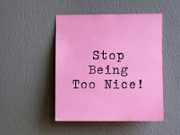|
|
|
|
 
 |
| (MirageC/Getty Images) |
We hear it all the time as leaders: "Work on your weaknesses." But author and leadership expert Mark Murphy argues that a more effective approach is to build a team that fills in those gaps. Murphy identifies five essential team roles: directors, achievers, stabilizers, harmonizers and trailblazers. "A leader who acknowledges their blind spot and deliberately fills it is not just more effective -- they're more strategic, more self-aware and ultimately far more successful," Murphy writes.
|
|
Put it into practice: Each of the five team roles Murphy outlines offers a unique contribution: decision-making, execution, organization, relationships and innovation. The absence of any one role leads to predictable dysfunctions, including conflict and a lack of follow-through. "The real work of leadership is assembling the right ecosystem of roles, not becoming a one-person ecosystem."
|
|
|
|
|
HR isn't just a box to check – it's a strategic driver of growth. See how a full-service HR solution can help boost ROI. Save Your Spot » |
|
|
|
| ADVERTISEMENT |  |
|
 
| |
 |
| (ariya j/Getty Images) |
Being a people-pleaser at work can hinder your career advancement as you prioritize others' needs over your own goals, writes Beatriz Victoria Albina, a master certified coach, who explains that people-pleasing stems from a desire to avoid discomfort and manage others' emotions. Albina suggests building tolerance for discomfort as a way to break the habit, starting with small steps, such as saying, "Let me think about it and get back to you," to give yourself time to consider whether you can take on more work.
|
|
|
|
Conflict is inevitable in daily life and the workplace, but it can be beneficial if managed effectively, writes Lisa Kohn of Chatsworth Consulting Group. Kohn offers five strategies for handling conflict: remembering the core objective, pausing before reacting, staying engaged without withdrawing, understanding the other person's perspective and collaborating to solve the problem. "Conflict is unavoidable and usually unenjoyable, but it can be handled well and it can yield great results," Kohn writes.
|
|
Put it into practice: When conflict arises and you're feeling angry or frustrated, pause and give yourself time to respond thoughtfully instead of reacting from your emotion, Kohn writes. " Stay present, even if you step out of the room to cool down. Don't ignore or avoid the conflict -- deal with it or it will never go away."
|
|
|
| Free eBooks and Resources |
|
 
| |
 |
| (Tom Merton/Getty Images) |
Exercising in natural, outdoor settings can significantly enhance psychological well-being, according to research. Outdoor exercise in green spaces may help reduce anxiety and anger, boost energy and positive effect and alleviate depression symptoms more effectively than working out in urban environments, writes psychiatry professor Brendan Kelly.
|
|
|
| Yesterday's Most Popular Leadership Stories |
|
| |
 |
| (Britannica Encyclopaedia) |
Bob Ross spent years painting "happy little trees" on public television, and now the sale of three of his paintings for more than $600,000 will go to support public TV stations facing federal funding cuts. Twenty-seven more paintings will go up for auction, and Bob Ross Inc. has partnered with "Last Week Tonight with John Oliver" to sell other collectibles, potentially raising more than $1 million by the time the auction ends.
|
|
|
| SmartBreak: Question of the Day |
| Roseville High School in Northern California has cultivated a corpse flower that bloomed recently. What is the flower's native habitat? |
|
|
| |
 |
| Chellew (Photo credit: Lester Boykin) |
You know that slightly queasy feeling when someone asks you to do just one more thing, even though your calendar is bursting at the seams? That's the classic people-pleaser at work -- and part of the problem isn't just saying "yes," it's the fear behind the "no." As Beatriz Victoria Albina's article explains, people-pleasing often springs from a nervous system that's desperate to avoid disappointing others. Learning to tolerate that internal discomfort -- instead of immediately soothing everyone else's emotions -- is the real breakthrough. Now throw conflict into the mix, and things can really feel overwhelming. But here's the twist: conflict isn't inherently bad. According to Lisa Kohn with Chatsworth Consulting, it's a golden opportunity for growth, not chaos. Kohn's advice? First, get clear on what you actually want in the situation -- then pause instead of reacting, step into the other person's shoes and together reframe the conflict as a shared problem to solve. Putting these two ideas together gives you a superpower. Instead of shrinking back or saying "yes" to avoid waves, you build a tolerance for the discomfort of honest conversations. You don't just avoid conflict by people-pleasing; you lean into it thoughtfully, with curiosity and integrity. When you let your true boundaries show -- and invite others to do the same -- conflict becomes less about "who's right" and more about "what's next." And bingo: no more being everyone's favorite yes-person -- just a more authentic, thoughtful you. If this newsletter helps you, please tell your colleagues, friends or anyone who can benefit. Forward them this email, or send this link. What topics do you see in your daily work that I should know about? Do you have any feedback you'd like to share? Drop me a note. And while you're at it, please send me photos of your pets, your office and where you spend your time off so we can share them. |
|
|
| Got this from a friend? Subscribe now and stay in the loop! |
|
 |
|
| |
Who Said It?
Remember you are this universe and this universe is you. |
Joy Harjo or Alice Wong
Check your answer here. |
|
| |
 |
|
|
 
|
|
|
|
|
|
| Copyright © 2025 SmartBrief. All Rights Reserved. A division of Future US LLC. |
| Full 7th Floor, 130 West 42nd Street, New York, NY, 10036. |
|
|
|
|